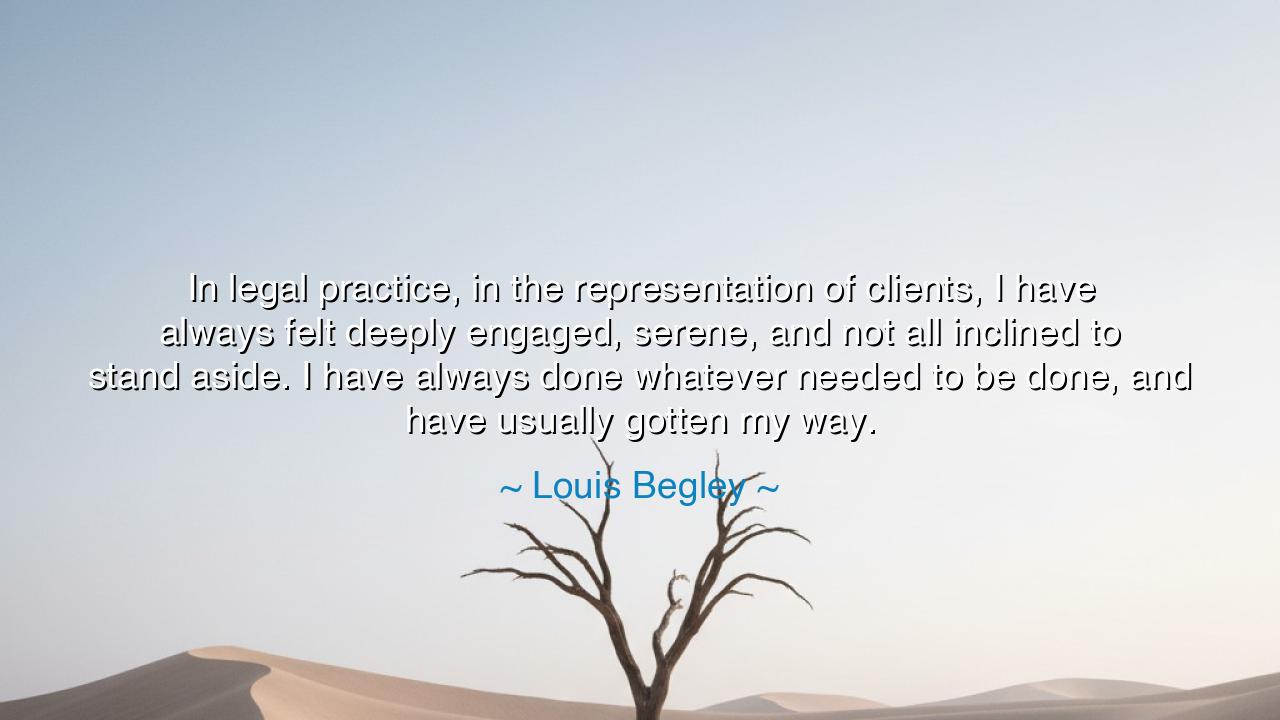
In legal practice, in the representation of clients, I have
In legal practice, in the representation of clients, I have always felt deeply engaged, serene, and not all inclined to stand aside. I have always done whatever needed to be done, and have usually gotten my way.






Hearken, O seekers of wisdom, to the words of Louis Begley, who spoke not as a mere attorney, but as one who understood the sacred weight of human struggle and intellect: “In legal practice, in the representation of clients, I have always felt deeply engaged, serene, and not at all inclined to stand aside. I have always done whatever needed to be done, and have usually gotten my way.” In these words lives a testament to dedication, mastery, and the noble art of steadfast conviction—a reminder that true victory in one’s craft is born not from ambition alone, but from presence of mind, calm of spirit, and unwavering devotion to duty.
Since the earliest days of civilization, the figure of the advocate has stood as both guardian and warrior. In the marketplaces of Athens, where law was first spoken before the people, the orator was charged with defending not only the client’s rights but the dignity of reason itself. In the Roman forum, men like Cicero fought battles not with swords but with words, seeking truth amid power and corruption. Begley’s reflection is the modern echo of that ancient tradition—a man who does not “stand aside,” but steps wholly into the fire of responsibility, mastering both the intellect and the temper required to move the forces of justice.
To be “deeply engaged and serene” is no small feat. It is to possess the heart of a warrior and the soul of a sage. Many approach their work as labor or performance, but Begley speaks of it as an act of harmony between the self and the task. In the storm of legal practice, where arguments clash like thunder and the fates of lives hang in the balance, serenity is the highest strength. For serenity allows clarity, and clarity commands victory. Thus, his “getting his way” is not arrogance—it is the fruit of disciplined mastery, of having learned that composure is mightier than fury.
Consider the tale of Abraham Lincoln, who before becoming a great leader was a humble lawyer. He, too, was known for his serenity and focus, his refusal to argue for the sake of pride. When faced with injustice, he did not rage blindly—he reasoned calmly, persuasively, and always from a place of integrity. Like Begley, Lincoln believed that one serves best when one is fully engaged, yet guided by an inner stillness. From such men we learn that true power is not the loudness of one’s will, but the steadiness of one’s purpose.
Begley’s words also conceal a philosophy of life beyond the courtroom. To “do whatever needs to be done” is the creed of all who achieve mastery, in law or in love, in art or in governance. It is the willingness to face complexity without retreat, to act when others hesitate, and to shoulder burdens with both skill and grace. This spirit—the refusal to “stand aside”—is the dividing line between those who merely work and those who transform the world through their work.
Yet, his serenity also reminds us that achievement without humility is hollow. The great lawyer, the true craftsman, the noble soul—all know that control over one’s self is the foundation of all external triumphs. Begley’s confidence—“I have usually gotten my way”—is not the boast of a tyrant, but the quiet assurance of one who has mastered his art, who wins not through domination but through understanding. Such assurance is the natural end of a lifetime spent in disciplined service to one’s principles.
O seekers of meaning, take this lesson into your own lives: whether you stand in a court of law, a house of trade, or the silent chambers of the heart, cultivate the balance of engagement and serenity. Do not fear to act, but let every action arise from clarity. Do not shrink from duty, but approach it with calm confidence. To live as Begley describes—to act with purpose, to remain composed, to persevere without boasting—is to achieve the highest form of excellence: mastery of self and craft alike.
And remember this, above all: serenity is not passivity—it is strength at rest. In the world’s noise and contention, the one who stands calm, alert, and ready to act will always find their way, and more often than not, will get their way—not by force, but by wisdom.






AAdministratorAdministrator
Welcome, honored guests. Please leave a comment, we will respond soon